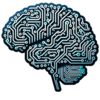
Back ألفازيرو Arabic AlphaZero Byelorussian AlphaZero BE-X-OLD AlphaZero Catalan AlphaZero CEB AlphaZero German AlphaZero Spanish آلفا زیرو Persian AlphaZero French AlphaZero HE
| This article is part of the series on |
| Chess programming |
|---|
 |
| Part of a series on |
| Artificial intelligence |
|---|
AlphaZero is a computer program developed by artificial intelligence research company DeepMind to master the games of chess, shogi and go. This algorithm uses an approach similar to AlphaGo Zero.
On December 5, 2017, the DeepMind team released a preprint paper introducing AlphaZero,[1] which would soon play three games by defeating world-champion chess engines Stockfish, Elmo, and the three-day version of AlphaGo Zero. In each case it made use of custom tensor processing units (TPUs) that the Google programs were optimized to use.[2] AlphaZero was trained solely via self-play using 5,000 first-generation TPUs to generate the games and 64 second-generation TPUs to train the neural networks, all in parallel, with no access to opening books or endgame tables. After four hours of training, DeepMind estimated AlphaZero was playing chess at a higher Elo rating than Stockfish 8; after nine hours of training, the algorithm defeated Stockfish 8 in a time-controlled 100-game tournament (28 wins, 0 losses, and 72 draws).[2][3][4] The trained algorithm played on a single machine with four TPUs.
DeepMind's paper on AlphaZero was published in the journal Science on 7 December 2018.[5] While the actual AlphaZero program has not been released to the public,[6] the algorithm described in the paper has been implemented in publicly available software. In 2019, DeepMind published a new paper detailing MuZero, a new algorithm able to generalize AlphaZero's work, playing both Atari and board games without knowledge of the rules or representations of the game.[7]
- ^ "Silver" (PDF). www.idi.ntnu.no.
- ^ a b Silver, David; Hubert, Thomas; Schrittwieser, Julian; Antonoglou, Ioannis; Lai, Matthew; Guez, Arthur; Lanctot, Marc; Sifre, Laurent; Kumaran, Dharshan; Graepel, Thore; Lillicrap, Timothy; Simonyan, Karen; Hassabis, Demis (December 5, 2017). "Mastering Chess and Shogi by Self-Play with a General Reinforcement Learning Algorithm". arXiv:1712.01815 [cs.AI].
- ^ Knapton, Sarah; Watson, Leon (December 6, 2017). "Entire human chess knowledge learned and surpassed by DeepMind's AlphaZero in four hours". Telegraph.co.uk. Retrieved December 6, 2017.
- ^ Vincent, James (December 6, 2017). "DeepMind's AI became a superhuman chess player in a few hours, just for fun". The Verge. Retrieved December 6, 2017.
- ^ Silver, David; Hubert, Thomas; Schrittwieser, Julian; Antonoglou, Ioannis; Lai, Matthew; Guez, Arthur; Lanctot, Marc; Sifre, Laurent; Kumaran, Dharshan; Graepel, Thore; Lillicrap, Timothy; Simonyan, Karen; Hassabis, Demis (December 7, 2018). "A general reinforcement learning algorithm that masters chess, shogi, and go through self-play". Science. 362 (6419): 1140–1144. Bibcode:2018Sci...362.1140S. doi:10.1126/science.aar6404. PMID 30523106.
- ^ "Chess Terms: AlphaZero". Chess.com. Retrieved July 30, 2022.
- ^ Schrittwieser, Julian; Antonoglou, Ioannis; Hubert, Thomas; Simonyan, Karen; Sifre, Laurent; Schmitt, Simon; Guez, Arthur; Lockhart, Edward; Hassabis, Demis; Graepel, Thore; Lillicrap, Timothy (2020). "Mastering Atari, Go, chess and shogi by planning with a learned model". Nature. 588 (7839): 604–609. arXiv:1911.08265. Bibcode:2020Natur.588..604S. doi:10.1038/s41586-020-03051-4. PMID 33361790. S2CID 208158225.
